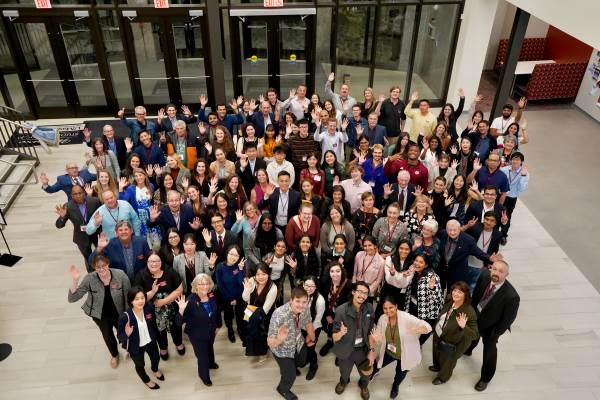UMassGives 2024

The origin of the Department of Food Science at the University of Massachusetts, Amherst began in January 1913 with a visionary initiative. Dr. Frank Waugh, then heading the Department of Horticulture, invited Walter Chenoweth to address fruit growers on Horticultural Manufactures. Chenoweth pioneered teachings in food preservation, laying the foundation for the Pomology Department. The context of World War I emphasized addressing food shortages, prompting college staff mobilization and culminating in the formal founding of the Department of Horticultural Manufactures in 1918. This pivotal moment marked the inception of the first department of this kind in the US; thus, the nation's first food science department was born.
Today, the Department of Food Science at the University of Massachusetts, Amherst stands as a testament to excellence in food science education and research. Garnering top accolades nationwide, our department was ranked first in our research by the U.S. National Research Council in 2010, and has routinely been ranked among the top globally by multiple outlets, including #1 in the U.S. by U.S. Business News & World Report and Shanghairankings.com. This reaffirms our dedication to scholarly achievement and student success.
Furthermore, we remain steadfast in our commitment to fostering diversity, equity, and inclusion within our university community and beyond. Through targeted efforts in recruitment, support, and the cultivation of a culture of respect, we ensure that our department thrives on a vibrant tapestry of backgrounds and viewpoints, enriching the educational experience and fostering an environment conducive to success for all.
Amidst mounting challenges to food supply and health in the U.S., the demand for innovative food scientists is rising. Pursuing a food science major offers a direct contribution to tackling these issues. Students delve into topics like climate change's impact on agriculture and sustainable farming techniques, equipping them to devise solutions for food security. They also play a vital role in developing efficient food production systems and crafting nutritious options for a growing, aging population. Collaboration with various sectors drives innovation in food processing and promotes healthier choices.
By supporting our department, you contribute to a legacy of innovation and excellence that spans over a century and continues to shape the future of food science.
| Rank | Prize | Department/Group/RSO | Donors |
|---|---|---|---|
| 1 | $2,000 | Student Alumni Association | 128 |
| 2 | $500 | UMass Women into Leadership | 90 |
| 3 | $500 | Professional Writing and Technical Communication | 36 |
| 4 | College of Education Student Emergency Fund | 10 | |
| 5 | Men's Lacrosse | 8 | |
| 6 | Finance Department | 6 | |
| 7 | Management Department | 6 | |
| 8 | Women's Lacrosse | 6 | |
| 9 | Isenberg Class of 2024 Senior Gift | 6 | |
| 10 | Commonwealth Honors College | 5 | |
| 11 | CICS Dean's Opportunity Fund | 5 | |
| 12 | The Galbraith Prize | 4 | |
| 13 | Mark H. McCormack Department of Sport Management | 4 | |
| 14 | Men's Swimming & Diving | 4 | |
| 15 | WMUA | 4 |

| Rank | Prize | Department/Group/RSO | Donors |
|---|---|---|---|
| 1 | $2,000 | Protect Our Breasts | 112 |
| 2 | $500 | University Without Walls | 69 |
| 3 | $500 | Landscape Architecture & Regional Planning | 31 |
| 4 | Department of Psychological and Brain Sciences | 29 | |
| 5 | Indian Classical Arts Society | 27 | |
| 6 | Public Interest Technology Club | 17 | |
| 7 | Accounting Department | 15 | |
| 8 | Club Softball | 12 | |
| 9 | Operations & Information Management Department | 11 | |
| 10 | Hockey | 10 | |
| 11 | Men's Lacrosse | 6 | |
| 12 | College of Natural Sciences Scholarships | 5 | |
| 13 | Mark H. McCormack Department of Sport Management | 4 | |
| 14 | Institute of Diversity Sciences | 4 | |
| 15 | Football | 4 |

| Rank | Prize | Department/Group/RSO | Donors |
|---|---|---|---|
| 1 | $2,000 | Minuteman Marching Band | 87 |
| 2 | $500 | Fencing Club | 74 |
| 3 | $500 | Active Minds | 65 |
| 4 | Climbing Club | 60 | |
| 5 | HackUMass | 33 | |
| 6 | Department of Journalism | 26 | |
| 7 | Society of Hispanic Professional Engineers | 13 | |
| 8 | UMass Recovery | 10 | |
| 9 | Hockey | 8 | |
| 10 | Marketing Department | 6 | |
| 11 | Football | 5 | |
| 12 | Mark H. McCormack Department of Sport Management | 4 | |
| 13 | Field Hockey | 4 | |
| 14 | Finance Department | 3 | |
| 15 | College of Natural Sciences Scholarships | 3 |

| Rank | Prize | Department/Group/RSO | Donors |
|---|---|---|---|
| 1 | $2,000 | The Massachusetts Daily Collegian | 277 |
| 2 | $500 | Men's Ultimate Frisbee | 134 |
| 3 | $500 | UMass CHAARG | 99 |
| 4 | Mark H. McCormack Department of Sport Management | 85 | |
| 5 | The Boltwood Project | 75 | |
| 6 | Ellsberg Initiative for Peace and Democracy | 74 | |
| 7 | Minutemen Racing | 73 | |
| 8 | Mock Trial Team | 66 | |
| 9 | Earthfoods Cafe | 64 | |
| 10 | Doo Wop Shop | 60 | |
| 11 | Muslim Students Association | 60 | |
| 12 | Club Water Polo | 54 | |
| 13 | S#arp Attitude | 50 | |
| 14 | Girl Up UMass Amherst | 40 | |
| 15 | Gospel Choir | 23 |

| Rank | Prize | Department/Group/RSO | Donors |
|---|---|---|---|
| 1 | $2,000 | Stonewall Center | 160 |
| 2 | $500 | Model UN | 71 |
| 3 | $500 | Women for UMass Amherst | 48 |
| 4 | Film Studies Program | 41 | |
| 5 | Department of Biochemistry and Molecular Biology | 13 | |
| 6 | Hockey | 11 | |
| 7 | Sweets & More | 11 | |
| 8 | College of Education Student Emergency Fund | 8 | |
| 9 | Men's Cross Country/Track & Field | 5 | |
| 10 | Women's Lacrosse | 5 | |
| 11 | Mark H. McCormack Department of Sport Management | 4 | |
| 12 | CICS Dean's Opportunity Fund | 4 | |
| 13 | Isenberg Class of 2024 Senior Gift | 4 | |
| 14 | Department of Political Science | 3 | |
| 15 | Baseball | 3 |

| Rank | Prize | Department/Group/RSO | Donors |
|---|---|---|---|
| 1 | $2,000 | Men's Rugby | 167 |
| 2 | $500 | Women’s Rugby Football Club | 122 |
| 3 | $500 | Student Care & Emergency Response Fund | 52 |
| 4 | UMass EMS | 46 | |
| 5 | UMass Hillel | 33 | |
| 6 | Center for Latin Am., Caribbean, & Latino Studies | 31 | |
| 7 | Cape Cod Alumni Group | 21 | |
| 8 | WMUA | 17 | |
| 9 | CICS Dean's Opportunity Fund | 15 | |
| 10 | Hockey | 11 | |
| 11 | Sailing Team | 11 | |
| 12 | Baseball | 9 | |
| 13 | Women's Rowing | 8 | |
| 14 | Men's Soccer | 7 | |
| 15 | Delta Sigma Pi | 7 |

| Rank | Prize | Department/Group/RSO | Donors |
|---|---|---|---|
| 1 | $2,000 | Men's Club Rowing | 216 |
| 2 | $500 | Women's Club Ice Hockey | 123 |
| 3 | $500 | Spanish and Portuguese Studies | 78 |
| 4 | Filipino Student Association | 69 | |
| 5 | Nursing Study Abroad Scholarships | 25 | |
| 6 | Sylvan Snack Bar | 25 | |
| 7 | UMass MannMukti | 25 | |
| 8 | Field Hockey Club | 24 | |
| 9 | Men's Rugby | 19 | |
| 10 | Dean's Fund for Library Excellence | 12 | |
| 11 | Alpine Ski Team | 12 | |
| 12 | UMass IT Internship | 11 | |
| 13 | College of Education Student Emergency Fund | 8 | |
| 14 | Women’s Rugby Football Club | 8 | |
| 15 | Minutemen Dancers | 7 |

| Rank | Prize | Department/Group/RSO | Donors |
|---|---|---|---|
| 1 | $2,000 | Duly Noted | 270 |
| 2 | $500 | Women's Ultimate Frisbee | 148 |
| 3 | $500 | Boxing Club | 80 |
| 4 | Engineers Without Borders | 40 | |
| 5 | Cape Verdean Student Alliance | 32 | |
| 6 | Ballroom Dance Team | 30 | |
| 7 | Vocal Suspects | 27 | |
| 8 | Society of Asian Scientists and Engineers | 27 | |
| 9 | Greeno Sub Shop | 26 | |
| 10 | UMass ALTITUDE | 21 | |
| 11 | InterVarsity Christian Fellowship | 19 | |
| 12 | UMass International Genetically Engineered Machine | 15 | |
| 13 | Cycling Club | 12 | |
| 14 | Women's Lacrosse | 11 | |
| 15 | Gymnastics Club | 11 |


